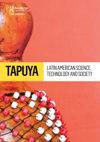Cartography of the Chilean exile in Baden-Württemberg: the story of the solidarity network
IF 1.2
Q2 HISTORY & PHILOSOPHY OF SCIENCE
Tapuya: Latin American Science, Technology and Society
Pub Date : 2022-12-31
DOI:10.1080/25729861.2022.2115221
引用次数: 0
Abstract
ABSTRACT The horror of the military coup in Chile motivated a massive international solidarity network. One of them was composed of self-organized citizens, NGOs, and Chilean exiles in the Federal Republic of Germany (FRG). This movement was a response to affected individuals facing the lack of immediate measures and policies of the FRG’s government towards exile and human rights violation victims in Chile. This article offers a cartography that traces key locations of such solidarity network: places where solidarity events took place, where the subjects involved reside, and their transits; with a special but not exclusive focus on the state of Baden-Württemberg, in the federal south. Considering the historical moment when this took place – Cold War scenario: Germany divided between the two ruling blocks – the cartography shows how this movement was a way of subverting that geopolitical order. This work, therefore, is a new contribution to the studies of solidarity and, at the same time, it links those studies with the field of STS, by presenting a cartography as a visual dispositif that documents the imbrications of solidarity, affections, politics, culture, Germans, and Chileans on a given territory.巴登-符腾堡州智利流亡者的制图:团结网络的故事
智利军事政变的恐怖引发了一个庞大的国际团结网络。其中一个由自发组织的公民、非政府组织和在德意志联邦共和国的智利流亡者组成。这场运动是对受影响的个人的回应,他们面临着FRG政府对智利流亡和人权侵犯受害者缺乏即时措施和政策的问题。本文提供了一幅地图,追踪了这种团结网络的关键地点:团结事件发生的地方,涉及的主题居住的地方,以及他们的过境;并特别关注联邦南部的巴登-符腾堡州(baden - w rttemberg)。考虑到这种情况发生的历史时刻——冷战情景:德国被两个统治集团分裂——地图显示了这种运动是如何颠覆地缘政治秩序的。因此,这项工作是对团结研究的一项新贡献,同时,它将这些研究与STS领域联系起来,通过将地图绘制作为视觉配置文件,记录特定领土上的团结,情感,政治,文化,德国人和智利人的砖块。
本文章由计算机程序翻译,如有差异,请以英文原文为准。
求助全文
约1分钟内获得全文
求助全文
来源期刊

Tapuya: Latin American Science, Technology and Society
Social Sciences-Social Sciences (all)
CiteScore
1.60
自引率
0.00%
发文量
39
审稿时长
19 weeks
 求助内容:
求助内容: 应助结果提醒方式:
应助结果提醒方式:


